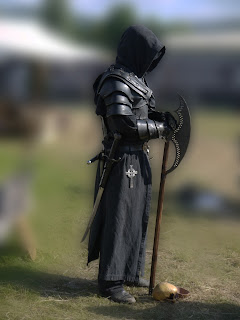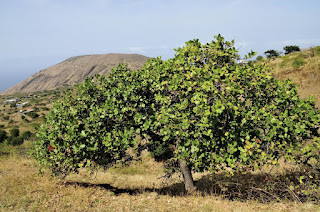The Executioner's Dream By Kwesi Brew
I dreamt I saw an eye, a pretty eye
In your hands
Glittering, wet and sikening
Like a dull onyx set in a crown of thorns
I did not know you were dead
When you dropped it in my lap
What horrors of human sacrifice
Have you seen, executioner?
What agonies of tortured men
Who sat through nights and nights of pain
Tongue-tied by the wicked sappor
Gazing at you with hot imploring eyes?
Those white lilies tossed their little heads then
In the moon-steeped ponds;
There was bouncing gaiety in the crisp chirping of the cricket in the undergrowth
And as the surf-boats splintered the waves
I saw the rainbow in your eyes
And in the flash of your teeth
As each crystal shone,
I saw sitting hand in hand with melancholy
A little sunny child
Playing at the marbles with husks of fallen stars:
Horrors were your flowers then;
The blood-bright bougainvilleas,
They delighted you.
Why do you weep
And offer me this little gift
Of a dull onyx set in a crown of thorns?
Then we are taken back to the time of childhood where the beauty, liveliness and innocence of the surroundings (line 12-16) are contrasted with the disposition and not-so-innocent pastimes which formed the character of the executioner.
Finally, we are brought back to the present, to the gory dismembered eye and the implied rejection of the executioner's bloody peace-offering.
In your hands
Glittering, wet and sikening
Like a dull onyx set in a crown of thorns
I did not know you were dead
When you dropped it in my lap
What horrors of human sacrifice
Have you seen, executioner?
What agonies of tortured men
Who sat through nights and nights of pain
Tongue-tied by the wicked sappor
Gazing at you with hot imploring eyes?
Those white lilies tossed their little heads then
In the moon-steeped ponds;
There was bouncing gaiety in the crisp chirping of the cricket in the undergrowth
And as the surf-boats splintered the waves
I saw the rainbow in your eyes
And in the flash of your teeth
As each crystal shone,
I saw sitting hand in hand with melancholy
A little sunny child
Playing at the marbles with husks of fallen stars:
Horrors were your flowers then;
The blood-bright bougainvilleas,
They delighted you.
Why do you weep
And offer me this little gift
Of a dull onyx set in a crown of thorns?
Poem Analysis
This is a nightmare poem. And yet we are not allowed to escape without feeling by dismissing it as a dream. The poet uses elements that are realistic enough to enforce our reactions. Like a dream, the poem shifts in time and point of emphasis, from the gory picture of the abstracted eye (lines 1-6), to contemplation of the horror that is part of the experience of the executioner (lines 7-10)Then we are taken back to the time of childhood where the beauty, liveliness and innocence of the surroundings (line 12-16) are contrasted with the disposition and not-so-innocent pastimes which formed the character of the executioner.
Finally, we are brought back to the present, to the gory dismembered eye and the implied rejection of the executioner's bloody peace-offering.






